PRINCETON, NJ -- Despite recent negative press, a majority of Americans, 54%, think the U.S. Transportation Security Administration is doing either an excellent or a good job of handling security screening at airports. At the same time, 41% think TSA screening procedures are extremely or very effective at preventing acts of terrorism on U.S. airplanes, with most of the rest saying they are somewhat effective.
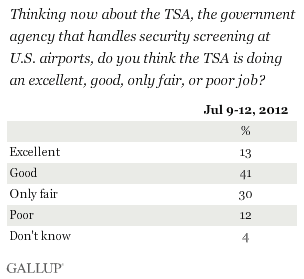
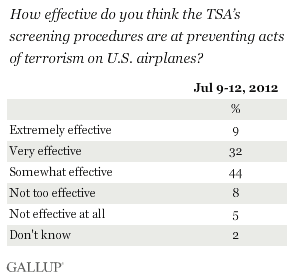
The TSA in recent months has come under increased scrutiny, with some members of Congress calling for the agency to be privatized or disbanded. However, the current survey results, from Gallup interviewing conducted July 9-12, indicate that the average American has a more positive than negative impression of the TSA, even if the average American is not totally confident in the effectiveness of its procedures.
Overall, Fliers' Opinions Similar to Non-Fliers'
Just over half of Americans report having flown at least once in the past year. These fliers have a slightly better opinion of the job TSA is doing than those who haven't flown. Fifty-seven percent of those who have flown at least once and 57% of the smaller group who have flown at least three times have an excellent or good opinion of the TSA's job performance. That compares with 52% of those who have not flown in the past year.
There is little difference in opinions about the effectiveness of TSA's screening procedures by flying status; between 40% and 42% of non-fliers, as well as of those who have flown at least once and those who have flown at least three times, believe the procedures are at least very effective.
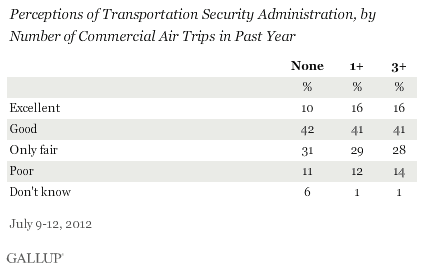
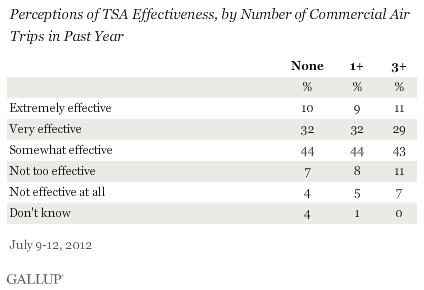
Parents of Minors and Non-Parents Have Similar Views
Adults' opinions are not related to whether they have a child under age 18 at home, with both parents and non-parents expressing similar views about the TSA. This is potentially important, given that the TSA instituted revised screening procedures for children under 12 in the fall of 2011 -- the result of the agency's efforts to establish risk-based security management for its screening operations.
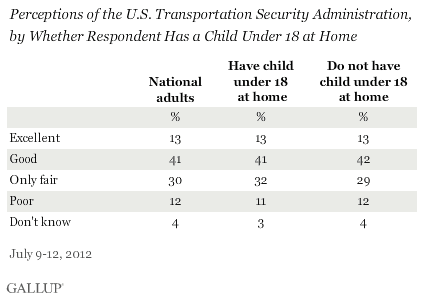
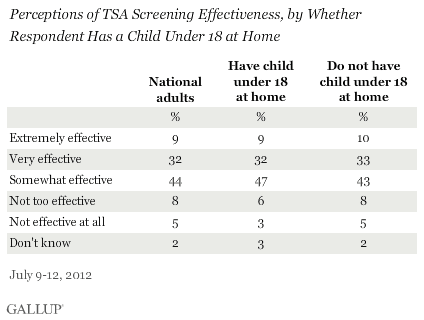
Opinions, Flying Behavior Vary Across Ages
Younger Americans have significantly more positive opinions of the TSA than those who are older. These differences may partly reflect substantial differences in flying frequency, with 60% of 18- to 29-year-olds reporting having flown within the last year, compared with 33% of those 65 years and older.
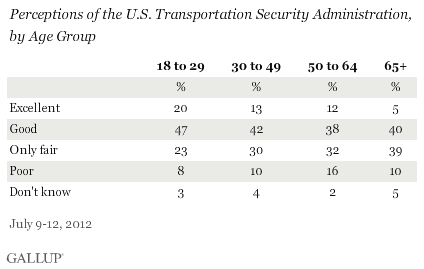
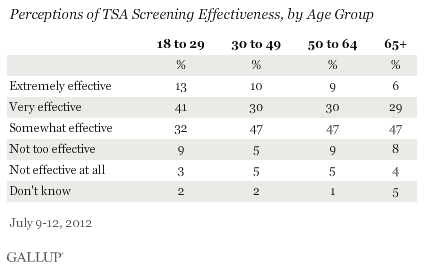
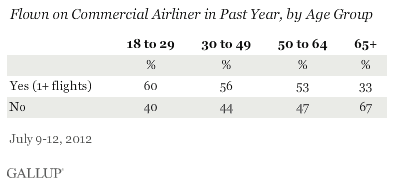
When the TSA was formed in late 2001, Americans who are now 18 to 29 were between 7 and 18 years old, meaning that their flying experience has been mostly in an environment in which increased airport security and TSA screening procedures are the norm.
Bottom Line
The American public gives the TSA a generally good report card, with a slight majority rating its overall job performance in positive terms. The fact that Americans who fly have a slightly more positive opinion of the agency than those who haven't flown recently suggests that experience with the TSA at airports does not detract from this image and may enhance it. Opinions about the effectiveness of the TSA are mixed, although most Americans and U.S. air travelers say the procedures are at least somewhat effective at preventing terrorism.
Survey Methods
Results for this Gallup poll are based on telephone interviews conducted July 9-12, 2012, with a random sample of 1,014 adults, aged 18 and older, living in all 50 U.S. states and the District of Columbia.
For results based on the total sample of national adults, one can say with 95% confidence that the maximum margin of sampling error is ±4 percentage points.
For results based on the total sample of 531 adults who have taken at least one air trip in the past year, one can say with 95% confidence that the maximum margin of sampling error is ±5 percentage points.
For results based on the total sample of 245 adults who have taken three or more air trips in the past year, one can say with 95% confidence that the maximum margin of sampling error is ±8 percentage points.
Interviews are conducted with respondents on landline telephones and cellular phones, with interviews conducted in Spanish for respondents who are primarily Spanish-speaking. Each sample includes a minimum quota of 400 cell phone respondents and 600 landline respondents per 1,000 national adults, with additional minimum quotas among landline respondents by region. Landline telephone numbers are chosen at random among listed telephone numbers. Cell phone numbers are selected using random-digit-dial methods. Landline respondents are chosen at random within each household on the basis of which member had the most recent birthday.
Samples are weighted by gender, age, race, Hispanic ethnicity, education, region, adults in the household, and phone status (cell phone only/landline only/both, cell phone mostly, and having an unlisted landline number). Demographic weighting targets are based on the March 2011 Current Population Survey figures for the aged 18 and older non-institutionalized population living in U.S. telephone households. All reported margins of sampling error include the computed design effects for weighting and sample design.
In addition to sampling error, question wording and practical difficulties in conducting surveys can introduce error or bias into the findings of public opinion polls.
View methodology, full question results, and trend data.
For more details on Gallup's polling methodology, visit www.gallup.com.
